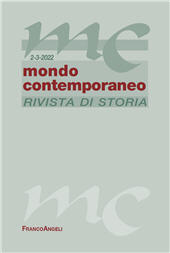Il Partito comunista italiano e la visione del futuro
195-213 p.
Il Partito comunista italiano, anche per differenziarsi dal messianismo socialista, non impostò la sua azione politica nel secondo dopoguerra su una "contrapposizione fra una società storica con oppressi e oppressori ed una società metastorica senza oppressi ed oppressori", come osservò Norberto Bobbio nel 1955. Cionondimeno, non c'è dubbio che negli "anni duri" della Guerra Fredda il riferimento al "materialismo dialettico", pur mitigato dalla pubblicazione dei Quaderni di Gramsci, ebbe un peso nel definire una prospettiva teleologica che lasciò tracce nella sua visione anche successivamente.
Dopo il 1956, però, una certa indeterminatezza ideologica, il proliferare di nuove correnti del marxismo, la trasformazione geopolitica del mondo e altri fattori si riverberarono sulla sua visione del futuro che tese a identificarsi con la stessa linea del partito. Negli ultimi due decenni di certezze sul futuro non ve ne furono più: se fu riaffermata l'"esigenza di socialismo" non lo era più la certezza del suo avvento, non rappresentava più in alcun modo un fatto inscritto nella dialettica della storia. [Testo dell'editore].
After World War II, the Italian Communist Party (Pci) wanted to differentiate it-self from socialist messianism. Therefore, as Norberto Bobbio remarked in 1955, it chose not to anchor its political action on a "contrast between, on the one hand, a historical society with oppressed people and oppressors, and, on the other hand, a metahistorical society without oppressors and oppressed people". Nevertheless, there is no doubt that in the "hard years" of the Cold War the reference to "dialec-tical materialism", although mitigated by the publication of Antonio Gramsci's Prison Notebooks, had a bearing on defining a teleological perspective that left long-term traces in the party's vision.
After 1956, however, a certain ideological indefiniteness, the proliferation of different paradigms of Marxism, the geopolitical transformation of the world, and other factors, all reverberated on the PCI's vision of the future, which tended to identify with the political line of the party itself. In the last two decades of the Cold War there were no more certainties about the future of the world: if the "need for socialism" was reaffirmed, the same could not be said of the certainty of its advent, which no longer represented in any way a fact inscribed in the "Dialectic of History". [Publisher's text].
Ist Teil von
Mondo contemporaneo : rivista di storia : 2-3, 2022-
Artikel aus derselben Ausgabe (einzeln erhältlich)
-
Informationen
ISSN: 1972-4853
THEMENBEREICHE
KEYWORDS
- Partito comunista italiano, ideologia, marxismo, operaismo, futuro, Antonio Gramsci
- Italian Communist Party, ideology, Marxism, Workerism, future, Antonio Gramsci


